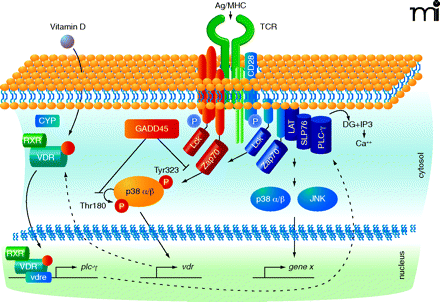
- Institution: Stanford Univ Med Ctr Lane Med Lib/Periodical Dept/Rm L109
- Sign In as Member / Individual
The Immunomodulatory Roles of Vitamin D: New Tricks for an Old Dog

New roles for the alternative p38 pathway and vitamin D3 in T cells. In naïve T cells, TCR signaling, coupled with costimulation of CD28, results in the activation of the mitogen-activated protein kinase termed p38 either by upstream MKKs, in a LAT-dependent mechanism (classical pathway; in blue), or, alternatively, by the protein tyrosine kinase Zap70, which is, itself, activated by Lck (alternative pathway; in orange). von Essen et al. (22) have identified a previously unknown mechanistic role for the latter alternative p38 pathway, uncovering a novel homeostatic, and potentially pro-inflammatory, role for vitamin D3 in T cells. Following Ag-driven TCR signaling, alternative p38 activation induces the expression of VDR. Consequently, T cells become susceptible to calcitriol, which is responsible for promoting PLC-γ expression, which, in turn, enhances the response to calcium, therefore contributing to the transition from a naïve to a fully competent Ag-primed T cell with increased functional avidity for antigen. Additional VDR-responsive genes in T cells are IL-2 and the Th-defining cytokines IFN-γ, IL-4, and IL-17.


